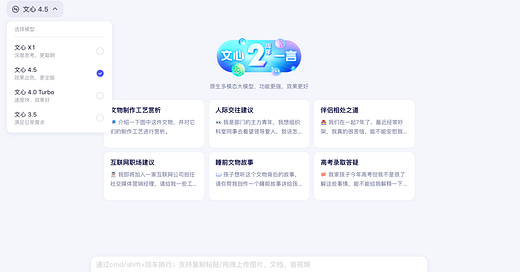Baidu Releases Two New Large AI Models to Rival DeepSeek, Focuses on Multimodality
Baidu has unveiled two new large-scale artificial intelligence models, positioning them as direct competitors to the rapidly emerging DeepSeek in China's fiercely contested AI landscape . The newly launched models include the X1 reasoning model and the Ernie 4.5 foundation model, with a significant emphasis on multimodal capabilities, suggesting an ambition to process and generate content across various formats like text, images, and audio . Furthermore, Baidu has announced plans to make its existing Wenxin large model open-source starting June 30th . This move underscores the escalating competition within China's AI sector, particularly in the domain of large language models. DeepSeek's recent advancements and its open-source, cost-efficient model released in January have exerted considerable pressure on established players such as Baidu . The strategic focus on multimodality by Baidu indicates a move towards developing more versatile AI applications that can cater to a broader range of user needs and industry demands . Baidu claims that its X1 model offers performance comparable to DeepSeek's R1 model but at half the cost, while Ernie 4.5 excels in understanding and processing diverse data types .
This development signifies a noticeable trend of rapid progress and intensifying rivalry within China's large language model market, where companies are actively vying for market dominance by offering enhanced performance and increasingly adopting open-source strategies . DeepSeek's emergence as a formidable competitor has likely prompted Baidu to accelerate its own development efforts and release these new models as a direct response . Baidu's decision to open-source its Wenxin model could further fuel this competition and drive innovation across the industry by lowering the barrier to entry for other developers and researchers . This accessibility could lead to wider adoption of these models and potentially the creation of novel applications across various sectors. The broader implication of this intense competition is the potential for more affordable and readily available AI tools for businesses and consumers within China, which could significantly accelerate the integration of AI technologies into diverse industries, ultimately impacting productivity and efficiency . Reports indicate that DeepSeek has already achieved a global ranking of second in AI applications, trailing only ChatGPT, highlighting its rapid progress and the challenge it poses to established players like Baidu . Some reports even suggest that OpenAI views DeepSeek as a "major risk," underscoring its significant impact in a relatively short time . Baidu's move to make its new models free for individual users further intensifies the competition . This could potentially lead to a price war in the large language model market, ultimately benefiting users with more affordable access to advanced AI capabilities .





